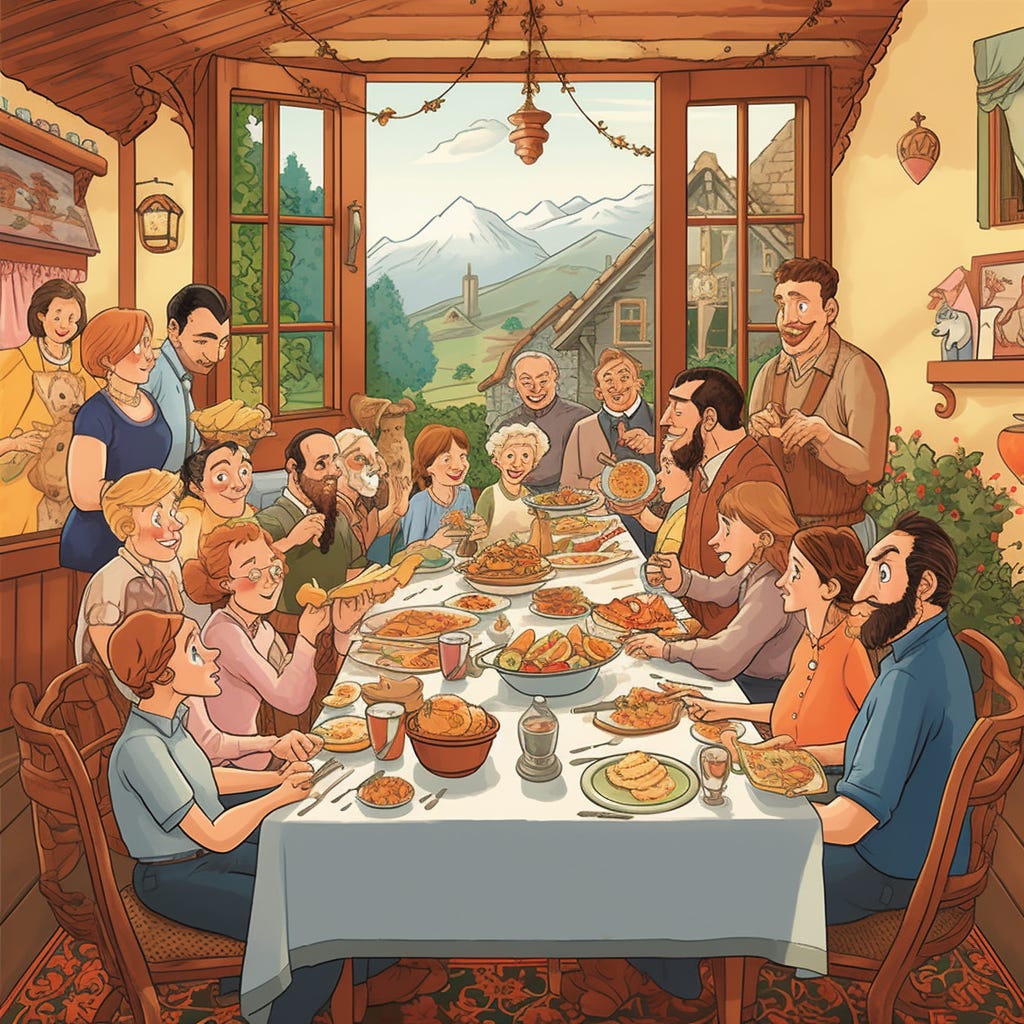TLDR - There is a path to aging with more dignity and more community than most people have access to now. Many of the ideas highlighted in the Techno-Canton concept have direct and positive implications for getting older. Sound money, lower professional transience, human-scale cities, and deregulation/nullification offer benefits not just to working professionals, but to people planning their “golden years.”
PURGATORY
I’ve been to purgatory.
I didn’t know that’s where I was going. I thought I was visiting a client who worked at a nursing home. The facility was a well-regarded outfit. The branding was excellent. The exterior was attractive; all the lightbulbs worked and the metal signage was brightly polished. It was surrounded by country club landscaping that evoked a Slim Aarons shot and all nestled in the metro area’s toniest suburb.
Despite all this, going inside felt like stepping through the door to the Twilight Zone. The place was clean and decorated, but not in quite the right way; it felt like a hospital redecorated by Stanley Kubrick. Aging residents, the financial batteries of the place, sat in wheelchairs at odd angles in disproportioned halls. A few ambled up and down aimlessly. All were alone.
There were plenty of white-scrubbed nurses, sure. Lovely people probably. They laughed and chatted voluminously amongst themselves. But they were all from Somewhere Else. Their quips and comments as alien as birdsong. Their interactions with residents purely mechanical - the push of a wheelchair or passage of a pill cup. I saw no other visitors.
Aptly, I was there to discuss computer equipment. A server or something. It was nominally there to support the services provided to the isolated residents. It felt like maybe it was the other way around. I did my work and left as fast as I could.
I’ve been to other nursing homes both more and less grim, but this one has always stood out in my mind. It had just the wrong mix of expensive quality signals and emotional humanity. It had all of the former and none of the latter. It wasn’t (to my knowledge) abusive, dirty, or dangerous. It was a perfectly good machine. But it was a machine. Human life went in, money came out.
Technical excellence totally devoid of community and emotional connection. That pretty much sums up our treatment of the elderly, doesn’t it?1
I’m not looking forward to it. Are you?
AGING IN TECHNO-CANTON
It doesn’t have to be this way. In the first Techno-Canton essay, I briefly alluded to an aging parent busily joining a Canton household, but the vision runs much deeper than that. Many of the solutions that enable the Techno-Canton would enable a more humane aging experience (2).
The main problem with the nursing home machine isn’t the machine itself, but the society that creates a demand for it. Elderly people isolated from their families and communities just need to be stored out of the way somewhere. Even for elderly people healthy enough to stay in their own homes, they are often left mostly alone, save for a few perfunctory family visits over the holidays. Why?
We’ve built a system that doesn’t leave other options. Professional transience often separates adult children from elder parents. Car-based cities keep elderly people home, even when they live nearby. Kleptocratic financial policy destroys wealth and with it, options. Zoning and medical regulation close off additional options.
PRESENCE
The original essay imagined a world in which remote work drives an increasingly stable local community and, in turn, demand for walkability in that community. Both would be good for increasing the presence of older people in day-to-day life. Adult children would be closer (with child-rearing and social benefits for the children too).
Walkability would enable a much wider range of activities and a much higher degree of independence. Regular walking would reduce sedentarism and provide health benefits as well. Public transportation is often thrown around as alternative to walkability, but almost anywhere that isn’t Manhattan, the density is too low for this to be viable. Nor were any of my grandparents keen to get slashed just to make it to Easter brunch.
The ability to walk into your 80s can’t be taken for granted. Even for immobile people, greater proximity will have benefits. Other non-drivers like grandchildren and friends can visit more easily. Non-public transportation options like self-driving car rentals (or even stock standard Uber rides) will be much cheaper.
Proximity takes a lot of moving around and rebuilding, which we will be better able to realize if we fix:
FINANCES
Our extant financial system is basically designed prevent financial independence in old age for all but the most successful.
Inflation erodes the value of savings. The only way to protect that value is participation in financial markets. Fees on 401ks, IRAs, index funds, and other financial “instruments” reach are billions per year - all coming out of the wealth we should be able to count on for sustenance - to say nothing of the abhorrent activism the money funds in the meantime. Property taxes in many jurisdictions require retirees to plan for hundreds of thousands in expenses to rent their own homes back from the government forever.
A return to sound money will make saving a viable option. Easier said than done perhaps, but as I work through detailed essays on many facets of the Techno-Canton project that I breezed over2, inflation will be a persistent villain. It’s a bit arcane, but inflation is nothing shy of social poison.
Even with sound money, not everyone will WANT to live by themselves. I’ve heard anecdotes that multi-generational living is on the rise as are “mother-in-law” expansions to homes. (My own in-laws live with us for part of the year.) The system makes that tough.
Many zoning laws restrict those types of buildings. Poor policy in several areas has driven housing prices up, raising the cost even where allowed. Tax codes incentive small, first homes and punish larger mortgages; credit risks are subsidized. Even for older people who wanted to contribute to these costs, penalties for early or bulk withdrawals and use-restricted funds (like HSAs) close those options off for many people.
A well-developed Canton with its own robust financial system (e.g. maybe its own currency) and the gumption to nullify the orders of higher levels of government could quickly unlock much higher levels of flexibility for the wealth older people already have stored.
Of course, a discussion of aging and finances is massively incomplete without discussing:
MEDICAL CARE
Medical costs (or wait times, which are a type of cost) have exploded in the West. In the US, this is often touted as some kind of failure of the “free market,” but nothing could be further from the truth.
Medical care is a real candidate for being the most-regulated industry in the US. Administrators, insurance, and compliance costs are soaring. In half of the country, certificate of need (“CON,” ha!) laws mean medical establishments need explicit government permission before adding a new MRI, X-ray, or ICU bed. The market is literally centrally-planned.
Medical insurance is legally required and unsettlingly linked to employment, making for a limited mix of options at retirement time. Even during employment, the insurance system is a major driver of cost and complexity. There is an entire sub-industry called “medical coding” that specializes in categorizing medical services into insurer taxonomies to maximize provider revenue.
The patients are not the customer. The customer is an insurer or a government. The insurer is legally obligated to pay. Their functional incentive to pay is only to pay as much as will keep the hoi polloi from revolting (either via class actions or democratic government pressure). There is no other incentive to provide either payment or effective care. Government buyers are even worse. They are subject to the same limited negative outcomes or less when they exempt themselves from liability via executive fiat. They don’t even have the incentive to maximize revenue, except to grow their own bureaucratic headcount.
As with proximity, cutting these costs back will depend on some level of deregulation. This likely politically untenable at a national level and will need to be led by consumer behavior and/or nullification. In the US, direct primary care (DPC) may show the way.
DPC providers do not work with insurers or government programs. Their only customers are their patients. They do not have to hire an army of compliance and “coding” staff. As such, costs and complexity are much lower3. Some even do old school house calls for their older customers.
DPC doesn’t have to repeal or even nullify the existing structure. It just… goes around it.
CULTURE
If old people could get around, live nearby, and have money to spend, would that solve the cultural problem I outlined in the opening anecdote?
I think it would help. There is a recursive aspect to culture. To say that old people in modern society are sidelined and ignored is as much an empirical statement as a normative one. Old people aren’t valued because much of the value they could provide - wisdom, familial lore, organization, emotional connection - is difficult to deliver from a nursing home room or from their old house without WiFi two states away.
By fixing some of the problems that functionally prevent old people from providing value, old people will become more valuable and thus more valued. With value comes respect, acceptance, and consideration.
CONCLUSION
There is a path to aging with more dignity and more community than most people can access now. Many of the ideas highlighted in the Techno-Canton concept have direct and positive implications for getting older. Sound money, lower professional transience, human-scale cities, and deregulation/nullification offer benefits not just to working professionals, but to people planning their “golden years.”
How do you want to live out old age? Reliving “One Flew Over the Cuckoos Nest” or walking down the street to join the weekly family dinner?
Although the “technical excellence” part is optimistic already and waning quickly.Although the “technical excellence” part is optimistic already and waning quickly.
Aging is just one of a few topics breezed over in the original essay that can easily be expanded upon in the Techno-Canton context. Others include parenting, education, religion, military matters, etc. More to come on these topics as I make time for it.
I recently had a significant procedure done through a DPC network, my total costs were lower paying cash than my out-of-pocket costs through my employer health insurance. Most DPC customers maintain “catastrophic” coverage for eventualities like trauma medicine or oncology where there is limited direct skill base and costs can quickly be bankrupting even at lower rates.





To lower medical costs, we need to soften the soul-destroying hazing that doctors go through. Sleep deprivation is a form of brainwashing, and medical interns/residents are put through it bigly.
Yes, this is a way of compressing more experience into less calendar time, but sleep deprivation makes memory worse. A cap on hours is called for. If that means a labor shortage, train more new doctors.